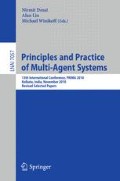Abstract
In a distributed spatialized information collecting system managed by a swarm of agents, where some are supposed disturbed, the maintenance of the system coherence and cooperation between reliable elements is a challenge. This paper tackles the problem of finding an efficient mechanism to ensure the coherence of the system and to optimize system performance. The main contribution of this paper consists of two major steps: (i) use trust-based mechanism to ensure the coherence and the robustness of the system; (ii) allow reliable elements to create dynamic clusters based on trust. We propose two different organizations in order to manage these issues and show how they must interact: a social one in which each agent maintains a TrustSet to estimate trust on others; a spacial one in which reliable elements are grouped in an “ad hoc type” network to improve cooperation between themselves.
Access this chapter
Tax calculation will be finalised at checkout
Purchases are for personal use only
Preview
Unable to display preview. Download preview PDF.
References
Nguyen Vu, Q.A., Gaudou, B., Canal, R., Hassas, S., Armetta, F.: Stratégie de communication dans un systéme de collecte d’information á base d’agents perturbés. In: Journées Francophones des Systémes Multi-Agents (JFSMA), France, pp. 207–217 (2009)
Nguyen Vu, Q.A., Gaudou, B., Canal, R., Hassas, S., Armetta, F.: TrustSets - Using trust to detect deceitful agents in a distributed information collecting system. In: 2010 IEEE-RIVF International Conference on Computing and Communication Technologies (2010)
Horling, B., Lesser, V.: A survey of multi-agent organizational paradigms. The Knowledge Engineering Review 19(4), 281–316 (2004)
Parker, L.E., Reardon, C.M., Choxi, H., Bolden, C.: Using critical junctures and environmentally-dependent information for management of tightly-coupled cooperation in heterogeneous robot teams. In: ICRA 2009: Proceedings of the, IEEE International Conference on Robotics and Automation, pp. 2872–2879. IEEE Press, Piscataway (2009)
Drira, K., Kheddouci, H., Tabbane, N.: Virtual dynamic topology for routing in mobile ad hoc networks. In: Proceedings of the International Conference on Late Advances in Networks ICLAN 2006, France, pp. 129–134 (2006)
Perkins, C.E.: Ad Hoc Networking. Addison-Wesley Professional (2008)
Haddad, M., Kheddouci, H.: A survey on graph based service discovery approaches for ad hoc networks. International Transactions on Systems Science and Applications (2007)
Le, V.T., Bouraqadi, N., Stinckwich, S., Moraru, V., Doniec, A.: Making networked robots connectivity-aware. In: ICRA 2009: Proceedings of the 2009 IEEE International Conference on Robotics and Automation, pp. 1835–1840. IEEE Press, Piscataway (2009)
Maclennan, B.: Synthetic ethology: An approach to the study of communication, pp. 631–658. Addison-Wesley (1991)
Balch, T., Ronald, Arkin, C.: Communication in reactive multiagent robotic systems. Autonomous Robots 1, 27–52 (1994)
Basagni, S.: Distributed clustering for ad hoc networks. In: ISPAN 1999: Proceedings of the 1999 International Symposium on Parallel Architectures, Algorithms and Networks, p. 310. IEEE Computer Society, Washington, DC, USA (1999)
Nguyen Vu, Q.A., Gaudou, B., Canal, R., Hassas, S., Armetta, F., Stinckwich, S.: Using trust and cluster organisation to improve robot swarm mapping. In: ROSIN 2010: Workshop on Robots and Sensors integration in Future Rescue INformation System (2010) (to appear)
Amouroux, E., Quang, C., Boucher, A., Drogoul, A.: GAMA: an Environment for Implementing and Running Spatially Explicit Multi-Agent Simulations. In: Ghose, A., Governatori, G., Sadananda, R. (eds.) PRIMA 2007. LNCS, vol. 5044, pp. 359–371. Springer, Heidelberg (2007)
Hassas, S.: Systèmes complexes à base de multi-agents situès. Universitè Claude Bernard-Lyon 1, Mèmoire d’habilitation à diriger les recherches (2003)
Author information
Authors and Affiliations
Editor information
Editors and Affiliations
Rights and permissions
Copyright information
© 2012 Springer-Verlag Berlin Heidelberg
About this paper
Cite this paper
Nguyen Vu, QA., Gaudou, B., Canal, R., Hassas, S., Armetta, F. (2012). A Cluster-Based Approach for Disturbed, Spatialized, Distributed Information Gathering Systems. In: Desai, N., Liu, A., Winikoff, M. (eds) Principles and Practice of Multi-Agent Systems. PRIMA 2010. Lecture Notes in Computer Science(), vol 7057. Springer, Berlin, Heidelberg. https://doi.org/10.1007/978-3-642-25920-3_43
Download citation
DOI: https://doi.org/10.1007/978-3-642-25920-3_43
Publisher Name: Springer, Berlin, Heidelberg
Print ISBN: 978-3-642-25919-7
Online ISBN: 978-3-642-25920-3
eBook Packages: Computer ScienceComputer Science (R0)

